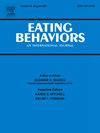美国陆军士兵负面身体形象与饮食质量之间的关系由饮食限制和情绪性进食介导。
IF 2.6
3区 医学
Q2 PSYCHIATRY
引用次数: 0
摘要
美国陆军士兵的身体成分要求可能会增加负面身体形象和不健康饮食行为的风险,这可能反过来导致营养不良。本研究旨在确定美国陆军士兵的负面身体形象是否与较差的饮食质量有关,以及饮食限制和情绪化饮食是否起到中介作用。本研究对完成军队饮食行为调查的美国陆军士兵进行了横断面研究(N = 427, 93%为男性,23±5岁)。使用健康饮食指数2015 (HEI-2015)计算饮食质量,以评估总HEI、充足性和适度成分。线性回归模型用于检验身体形象、饮食限制、情绪性进食和饮食质量之间的关系。通过中介模型检验饮食约束和情绪性饮食对身体形象与饮食质量关系的间接影响。结果表明,对身体形象的高度关注与较高的饮食限制相关(B = 0.12, p本文章由计算机程序翻译,如有差异,请以英文原文为准。
Dietary restraint and emotional eating mediate the relationship between negative body image and diet quality in U.S. Army Soldiers
Body composition requirements for U.S. Army Soldiers may increase risk of negative body image and unhealthy dietary behaviors, which may in turn lead to poor nutrition. This study aimed to determine whether negative body image was associated with worse diet quality in U.S. Army Soldiers and whether dietary restraint and emotional eating served as mediators. A cross-sectional study of U.S. Army Soldiers who completed the Military Eating Behavior Survey was conducted (N = 427, 93 % male, 23 ± 5 years of age). Diet quality was calculated using the Healthy Eating Index 2015 (HEI-2015) to assess total HEI, adequacy, and moderation components. Linear regression models were used to examine associations between body image, dietary restraint, emotional eating, and diet quality. Mediation models were tested to measure the indirect effect of dietary restraint and emotional eating on the association between body image and diet quality. Results demonstrated that higher concern with body image was associated with higher dietary restraint (B = 0.12, p < .0001) and higher emotional eating (B = 0.07, p = .0001). Dietary restraint was positively associated with Total HEI-2015 score (B = 1.10, p < .0001) and HEI-2015 moderation (B = 0.32, p < .0001) and adequacy (B = 0.78, p < .0001) scores. In mediation analyses, there was a significant indirect effect of body image on diet quality through restraint (a:0.25, b:0.41, c’:-0.12, ab:0.10; 95 % bootstrap CI: 0.06, 0.15) and emotional eating (a:0.18, b:-0.15, c’:0.05, ab:-0.04; 95 % bootstrap CI: −0.07, −0.01). Findings suggest that dietary restraint and emotional eating may be differentially associated with body image and diet quality. Whether these relationships persist over time is unclear.
求助全文
通过发布文献求助,成功后即可免费获取论文全文。
去求助
来源期刊

Eating behaviors
Multiple-
CiteScore
4.20
自引率
3.60%
发文量
65
审稿时长
60 days
期刊介绍:
Eating Behaviors is an international peer-reviewed scientific journal publishing human research on the etiology, prevention, and treatment of obesity, binge eating, and eating disorders in adults and children. Studies related to the promotion of healthy eating patterns to treat or prevent medical conditions (e.g., hypertension, diabetes mellitus, cancer) are also acceptable. Two types of manuscripts are encouraged: (1) Descriptive studies establishing functional relationships between eating behaviors and social, cognitive, environmental, attitudinal, emotional or biochemical factors; (2) Clinical outcome research evaluating the efficacy of prevention or treatment protocols.
 求助内容:
求助内容: 应助结果提醒方式:
应助结果提醒方式:


